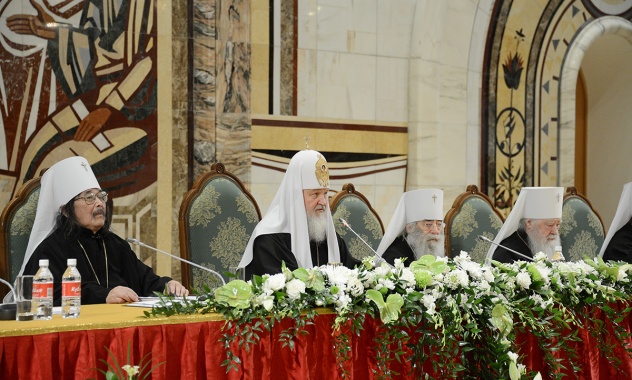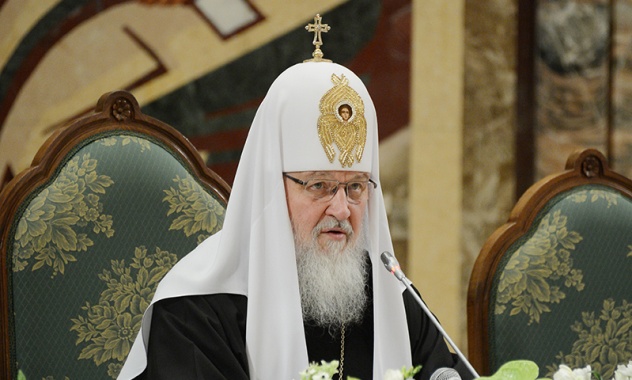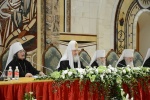Bishops’ Council of Russian Orthodox Church opens in Moscow
The Bishops’ Council of the Russian Orthodox Churches began its work at the Hall of Church Councils in the Cathedral of Christ the Saviour on 2 February 2013. 290 archpastors from 247 dioceses of the Russian Orthodox Church (ROC) were invited to take part in the Council. They arrived from Russia, Ukraine, Belarus, Moldova, Azerbaijan, Kazakhstan, Kirghistan, Latvia, Lithuania, Tadjikistan, Turkmenistan, Uzbekistan, Estonia, and from some far abroad countries in which the ROC dioceses exist.
The sessions were preceded by the Divine Liturgy celebrated in the Cathedral of Christ the Saviour.
Under the Statute of the Russian Orthodox Church, His Holiness the Patriarch of Moscow and All Russia chairs the Bishops’ Council.
The Presidium consists of the permanent members of the Holy Synod: Metropolitan Vladimir of Kiev and All Ukraine; Metropolitan Vladimir of St. Petersburg and Ladoga; Metropolitan Philaret of Minsk and Slutsk, Patriarchal Exarch of All Belarus; Metropolitan Juvenaly of Krutitsy and Kolomna; Metropolitan Vladimir of Kishinev and All Moldova; Metropolitan Varsonofiy of Saransk and Mordovia, Chancellor of the Moscow Patriarchate; Metropolitan Hilarion of Volokolamsk, Chairman of the Moscow Patriarchate’ Department for External Church Relations; and Metropolitan Aleksandr of Astana and Kazakhstan and Metropolitan Vikentiy of Central Asia who were included as permanent members by the decision of the Holy Synod of 5 October 2011pending approval by the Bishops’ Council.
Invited to the Presidium were Metropolitan Vladimir of Omsk and Tavricheskoye, Metropolitan Veniamin of Penza and Nizhniy Lomov, Archbishop Mark of Hust and Vinogradov, Archbishop Simon of Murmansk and Monchegorsk, and Bishop Savva of Tiraspol and Dubossary who take part in the winter session of the Synod.
Also, by the decision of the Holy Synod of 30 January 2013 (Minutes 8), invited to the Presidium were Metropolitan Daniel of Tokyo and All Japan, Metropolitan Hilarion of Eastern America and New York, Metropolitan Aleksandr of Riga and All Latvia and Metropolitan Korniliy of Tallinn and All Estonia due to the importance of participation of the autonomous and self-governing parts of the Moscow Patriarchate in the leadership of the Bishops’ Council.
The Bishops’ Council consists of the diocesan bishops and vicar bishops who head Synodal departments and theological academies or have canonical jurisdiction over parishes in their charge. Under the Statute of the Russian Orthodox Church, certain vicar bishops can attend the Bishops’ Council’s session without the right of casting vote.
Prayer service was celebrated before to the first plenary session. His Holiness Patriarch Kirill read an introductory prayer.
The4 participants submitted the rules of procedure, adopted the agenda and programme of the Council; approved credentials and drafting commissions and the counting board, and elected the Council’s secretary.
His Holiness Patriarch Kirill of Moscow and All Russia will present a report on the life and activities of the Russian Orthodox Church.
The participants will consider five draft documents elaborated by the Inter-Council Presence.
On 30 January 2013, the Holy Synod resolved to present to the Bishops’ Council draft Regulations for material and social support of priests, church workers and staff of religious organizations of the Russian Orthodox Church and of members of their families; and a draft of alterations and amendments to the Statute that should be introduced following the decisions of the Holy Synod taken in 2011-12 and in compliance with assignments given by the Bishops’ Council of 2011. Also, members of the Council will discuss a draft regulation on the awards of the Russian Orthodox Church.
Greetings to the Council were sent by Russian President Vladimir Putin, Ukrainian President Viktor Yanukovich, Byelorussian President Alexander Lukashenko, and Moldavian Prime Minister Vladimir Filat.
Other events
-
06.02.2013 19:44Press conference on results of Bishops’ Council of Russian Orthodox Church took place
-
05.02.2013 23:35Bishops’ Council of the Russian Orthodox Church took place on 2-5 February 2013
-
05.02.2013 23:31(Russian) Архиерейский Собор Русской Православной Церкви завершил свою работу
-
05.02.2013 14:10(Russian) Начался четвертый день работы Архиерейского Собора Русской Православной Церкви
-
04.02.2013 21:30(Russian) Завершился третий день работы Архиерейского Cобора Русской Православной Церкви
-
04.02.2013 12:44Bishops’ Council of Russian Orthodox Church continues its work
-
03.02.2013 21:31Bishops’ Council of Russian Orthodox Church completes its second day’s sessions
-
03.02.2013 15:19(Russian) Начался второй день работы Освященного Архиерейского Собора
-
03.02.2013 14:28(Russian) В неделю 35-ю по Пятидесятнице Предстоятель Русской Церкви совершил Литургию в Храме Христа Спасителя
-
03.02.2013 14:06(Russian) Святейший Патриарх: В межсоборный период велась активная работа по претворению в жизнь решений Архиерейского Собора 2011 года
-
03.02.2013 13:59(Russian) Святейший Патриарх Кирилл: Цель межрелигиозного диалога — совместное противостояние безнравственности, агрессивному безбожию и межнациональной вражде
-
03.02.2013 13:51(Russian) Святейший Патриарх Кирилл: Нравственные ценности являются ключом к созиданию межцивилизационного согласия и развитию международного сотрудничества
-
03.02.2013 13:42(Russian) Святейший Патриарх Кирилл: Церковь стремится найти союзников в деле сохранения христианского наследия и защиты традиционных христианских ценностей
-
03.02.2013 13:25(Russian) Святейший Патриарх Кирилл сообщил о развитии межправославных отношений в межсоборный период
-
03.02.2013 12:37(Russian) Святейший Патриарх Кирилл: Необходимо усиление катехизической работы среди казачества
-
03.02.2013 00:38(Russian) Освященный Архиерейский Собор Русской Православной Церкви завершил первый день работы
-
03.02.2013 00:35(Russian) Членам Архиерейского Собора представлен доклад Блаженнейшего митрополита Киевского и всея Украины Владимира
-
03.02.2013 00:20(Russian) Святейший Патриарх Кирилл рассказал о церковно-государственных отношениях в странах Балтии
-
03.02.2013 00:00(Russian) Митрополичий округ в Казахстане сотрудничает с государством и обществом в деле противодействия псевдорелигиозному экстремизму и терроризму
-
02.02.2013 23:45(Russian) Принятый в Молдове закон о культах делает возможной государственную регистрацию деструктивных культов
-
02.02.2013 23:43(Russian) Святейший Патриарх Кирилл: Православная Церковь играет определяющую роль в развитии духовных, государственных и культурных традиций белорусского народа
-
02.02.2013 23:41(Russian) Участников Архиерейского Собора проинформировали об актуальных темах диалога Украинской Православной Церкви с государственной властью Украины
-
02.02.2013 22:55(Russian) Участники Архиерейского Собора ознакомились с изменениями в российском законодательстве, имеющими значение для развития церковного служения
-
02.02.2013 22:46(Russian) Святейший Патриарх Кирилл: Апробация курса «Основы религиозных культур и светской этики» не привела к росту конфликтных настроений в школе
-
02.02.2013 22:40(Russian) Святейший Патриарх Кирилл: Церковь нельзя отделить от общества, потому что большинство населения стран, входящих в каноническую территорию Московского Патриархата, исповедует Православие
-
02.02.2013 22:37(Russian) Святейший Патриарх Кирилл: Православный журналист должен оставаться прежде всего церковным человеком
-
02.02.2013 22:29(Russian) Миссия в виртуальном пространстве не может подменять собой приходскую работу, но должна ее дополнять, подчеркнул Предстоятель Русской Церкви
-
02.02.2013 22:26(Russian) Предстоятель Русской Церкви: Формирование единого информационного поля — общецерковная задача, выполнить которую можно только общими усилиями
-
02.02.2013 19:53(Russian) Святейший Патриарх Кирилл считает необходимым обеспечить получение православной литературы епархиями Дальнего Востока, Центральной Азии и дальнего зарубежья
-
02.02.2013 19:37(Russian) Будет издано пособие для епархий, монастырей и храмов по использованию объектов культурного наследия церковного назначения
-
02.02.2013 19:32(Russian) Предстоятель Русской Церкви: Культурные центры при соборах и храмах призваны прививать уважительное отношение к культуре и традициям своего народа
-
02.02.2013 19:30(Russian) Более девятисот священников окормляют заключенных, находящихся в исправительных учреждениях России
-
02.02.2013 19:28(Russian) Проведена паспортизация церковных детских приютов
-
02.02.2013 19:22(Russian) Епархиям рекомендовано создавать межприходские и общеепархиальные социальные проекты
-
02.02.2013 19:19(Russian) Церковная благотворительность должна быть предметом неизменной заботы всех священнослужителей: от приходского диакона до Патриарха, убежден Предстоятель Русской Церкви
-
02.02.2013 19:15(Russian) Святейший Патриарх Кирилл: За созданием молодежной организации должна стоять пастырская задача — научение молодого поколения жизни по евангельским заповедям
-
02.02.2013 19:13(Russian) Число старообрядных приходов Русской Православной Церкви постепенно увеличивается
-
02.02.2013 19:04(Russian) На Архиерейском Соборе рассмотрели итоги миссионерской деятельности за межсоборный период
-
02.02.2013 19:02(Russian) Освященный Архиерейский Собор обсудит вопрос расхождения празднования Собора новомучеников и исповедников Российских в разных традициях Русской Церкви
-
02.02.2013 18:58(Russian) Предстоятель Русской Церкви: Нужно сохранять и развивать все лучшее в нашей многовековой, многообразной церковно-певческой традиции
-
02.02.2013 18:57(Russian) Святейший Патриарх Кирилл: Гостеприимство по отношению к паломникам должно быть неотъемлемой чертой деятельности современных монастырей
-
02.02.2013 17:06(Russian) Активное обсуждение проекта Положения о монастырях и монашествующих — это попытка отыскать пути возрождения традиций древнерусской монашеской жизни, считает Предстоятель Русской Церкви
-
02.02.2013 16:54(Russian) Святейший Патриарх Кирилл: Развитие богословской науки сегодня невозможно без следования лучшим мировым стандартам
-
02.02.2013 16:51(Russian) Участники Архиерейского Собора ознакомились с комплексом проектов по развитию религиозного образования в Церкви
-
02.02.2013 16:47(Russian) Святейший Патриарх Кирилл призвал создавать в епархиях советы из представителей местных духовных школ и светских теологических кафедр
-
02.02.2013 16:35(Russian) Органы высшего церковного управления разрабатывают программы подготовки профильных сотрудников для епархий
-
02.02.2013 16:32(Russian) Предстоятель Русской Церкви: Методические рекомендации в различных сферах церковного служения носят рамочный характер и должны применяться с учетом имеющихся возможностей
-
02.02.2013 16:30(Russian) Святейший Патриарх Кирилл: Мы не можем позволить себе множить не вполне подготовленное к служению духовенство
-
02.02.2013 15:58(Russian) В Русской Православной Церкви несут служение 290 архипастырей
-
02.02.2013 15:56(Russian) Московский Патриархат формирует реестр церковного имущества
-
02.02.2013 15:46(Russian) Участники Архиерейского Собора ознакомились с развитием приходской жизни в странах дальнего зарубежья
-
02.02.2013 15:01(Russian) Предстоятель Русской Церкви: Расположение храмов должно быть таково, чтобы длинная дорога к ним не становилась препятствием на пути к Богу
-
02.02.2013 14:42(Russian) Святейший Патриарх Кирилл: Приход — это не храм, а православный народ, проживающий на определенной территории
-
02.02.2013 14:38(Russian) Святейший Патриарх Кирилл: Все епархии, входящие в митрополию, несут общую ответственность за деятельность расположенных на ее территории духовных школ
-
02.02.2013 14:37(Russian) Предстоятель Русской Церкви: Митрополии — древняя и традиционная форма церковного устройства
-
02.02.2013 13:56(Russian) Святейший Патриарх Кирилл напомнил, что епископ — не просто администратор, но пастырь, готовый положить душу свою за каждого клирика и мирянина епархии
-
02.02.2013 13:53(Russian) В Русской Церкви насчитывается почти 34 тысячи храмов, где хотя бы раз в месяц совершается Божественная литургия
-
02.02.2013 13:31(Russian) Святейший Патриарх Кирилл: Главные задачи, которые стоят сегодня перед Церковью, были определены Поместным Собором 2009 года
-
02.02.2013 13:16(Russian) Празднование 1025-летия Крещения Руси приобретет всецерковный и широкий общественный характер на всем пространстве исторической Руси
-
02.02.2013 13:11(Russian) Святейший Патриарх Кирилл: Нападки на Церковь не поколебали церковного единства
-
02.02.2013 13:08(Russian) Святейший Патриарх призвал чад Русской Православной Церкви неотступно свидетельствовать о правде Божией и евангельских ценностях
-
02.02.2013 12:45(Russian) Святейший Патриарх Кирилл: Церковь всегда будет давать общественным процессам нравственную оценку и призывать участников любых противостояний к взаимоуважению и мирному диалогу
-
02.02.2013 11:55Bishops’ Council of Russian Orthodox Church opens in Moscow
-
31.01.2013 15:17(Russian) 2-5 февраля 2013 года в Москве пройдет Архиерейский Собор Русской Православной Церкви




















